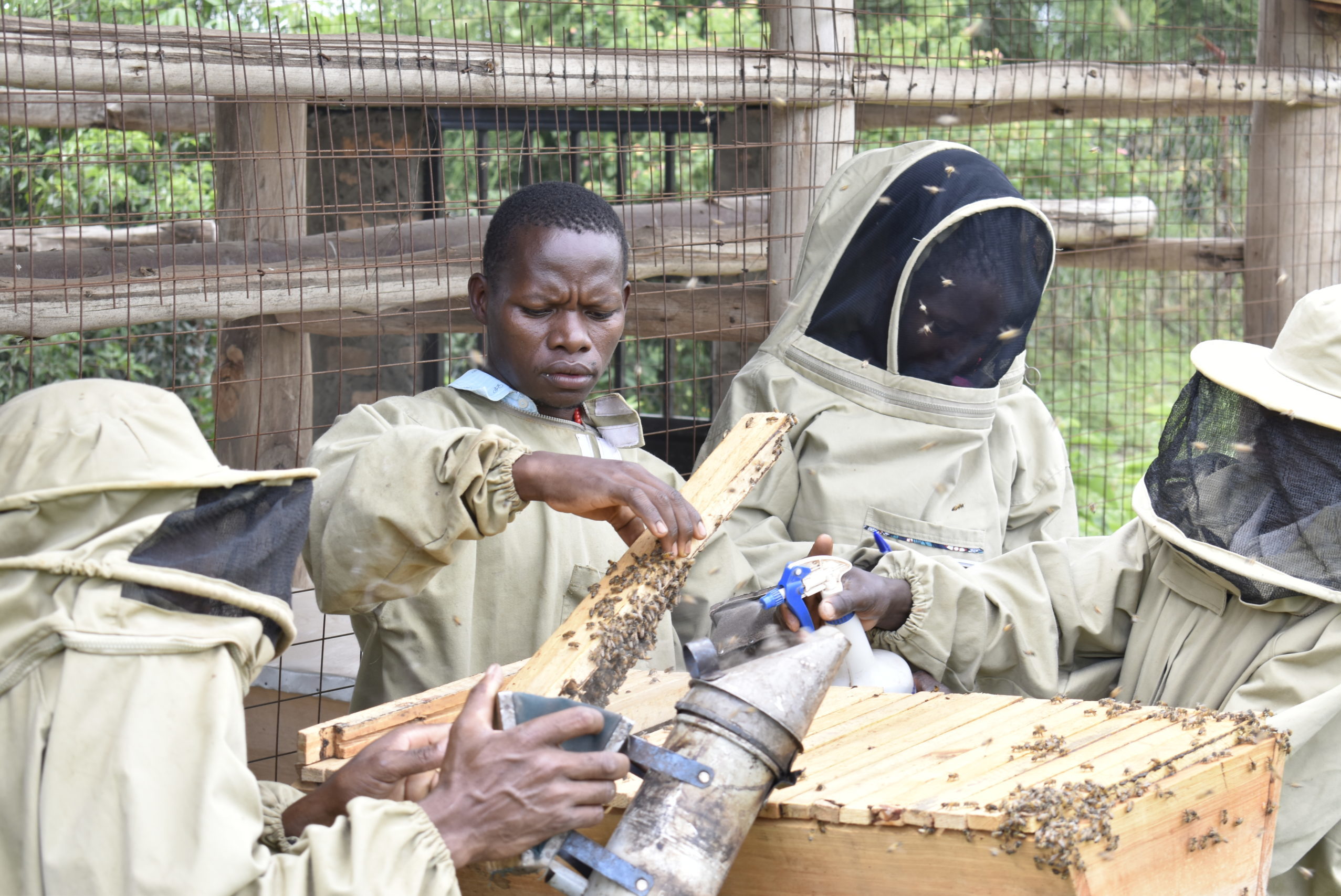Wasswa’s Journey in Bee keeping.
Wasswa Francis (28 years) is resident and a well-known upcoming youth farmer from Biwolobo, Lyantonde Subcounty, Lyantonde district due to his passion for agriculture. He joined Salama SHIELD Foundation (SSF) Uganda youth micro-finance livelihood program in 2018 after dropping out of the university in 2017 as an electrical engineer.
Wasswa had tried bee keeping several times on his own but failed due to lack of skills. But because of his passion and commitment, he was selected together with other 6 members to be trained as a community key champion during the SSF-U pilot bee keeping project.
He says “I was very excited to be one of those to take part in the project since I had considered bee keeping as a lucrative income generating activity despite the fact that it is thought of as a very risky venture. I had tried several times to find someone to train me the skills of commercial bee keeping but failed since most of the local bee keepers are not so much into commercial bee keeping. However with SSF pilot bee keeping project I was introduced to bee keeping and management i.e., hive making, colony inspection, apiary set-up, record bee keeping, wild colony hunting and transfer among others.
Through different exchange learning visits to the local and commercial bee keepers, agricultural expo 2024 at Kololo Independence grounds, I got a chance to see how the Kenyan Top Bar (KTB) hive looks like, this was enough to convince myself that I can, so I decided to start small and make a look alike KTB hive besides my house, I started a simple apiary with three bee hives i.e., one KTB I made myself and the two local/traditional bee hives I had bought from one old man in Kamulaba-Rakai district. Later on, I received a standard KTB hive from Salama SHIELD Foundation (SSF) Uganda upon completion of the bee hive making training workshop to enable me start up.
I started identifying bee colonies in the neighboring forests and transfer them to the apiary. However, this wasn’t an easy job for one man, so I decided to introduce bee keeping to the three of my relatives of (boys aged 14:13:12 respectively) I usually stay with me at home. But by then we didn’t have protective gears or smoker, so our first colony hunting was done in the night when bees are expected to be calm, we used a local flat iron but this wasn’t an easy job because you could not direct the smoke, therefore we had to use the mouth to blow the smoke to the direction we wanted, despite the fact that the bees were expected to be calm, they still stung us. It was also very challenging and this made me to realize that wild bee colony hunting is becoming difficult for us, so I decided to buy a smoker and also ask SSF to help me with a protective wear temporally as I look for money to buy mine.
The first colony I transferred to the bee hive went, the second one the same, but I did not lose hope because I had now gained much confidence with my team in bee colony hunting and handling. Luckily enough the third colony I transferred settled in very well. This was a call for celebrations. However, I realized, to safely catch the queen bee during the hunting exercise and to retain the bees, I need to cage the queen bee for some few days after transferring them to the bee hive, so I decided to buy a queen catcher.
My simple apiary was sitting on a very small place near the road and during colony inspection, I realized that one of the bee hives was full and contained some honey so I decided to do some pruning (removed some of the combs that night), however, bees became very hostile during the exercise, they had to sting me several times and the following day in the morning, they could not allow anyone on foot to pass by the road. So, I decided to solicit for a new location nearby which was safer and more convenient for the apiary, I used the strong relationship my mother had with the church (Kijjukizo Parish) and requested the church parish leader to allow me use part of the forest for my apiary in exchange for ensuring the forest is kept safe,
Currently I have 9 bee hives in the new location (An apiary of my own). Some of the key things I have learnt or observed so far in my bee keeping journey is:
- It’s better to start a retirement plan earlier and bee keeping could be one of the best options because it is a one-time investment project, the rest of the work is monitoring or colony inspection.
- Taking records and regular monitoring or colony inspection is very key in ensuring that you keep on track and do not lose any key detail.
- Bee keeping as any other agricultural project requires time and commitment, once you fail to invest some time for it, then you lose the track of the project.
With the experience I have gained so far in bee keeping and management is enough for me to start on my next 5-year future plan of at least 70 bee hives and being able to train fellow youth and other interested community members in bee keeping.
I am convinced that my future in bee keeping is very bright because in my 1st harvest, I earned UGX. 550,000/= from sale of only honey, I am currently a very busy man where local bee keepers have started calling me to provide them some services like apiary siting, harvesting and bee hive making which assures me of a full-time employment.
I am very much grateful for Salama SHIELD Foundation (SSF) and its partners GIZ under the Civil Society in Uganda Support Programme (CUSP) II co-financed by the European Union and the Germany government for considering the youth and community members to be part of the SSF-U Pilot bee keeping project since it is an investment opportunity.”


No responses yet